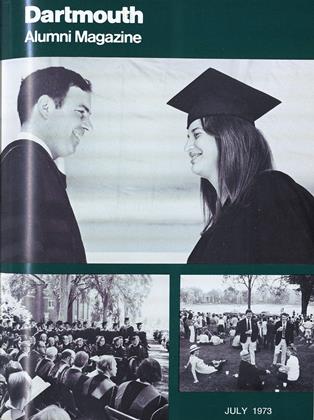June was a month of double commencement in Hanover. With graduation exercises for the Class of 1973 only two weeks in the past, the College fully commenced to a complete year-round academic operation.
The start June 24 of the first full-parity summer term, coequal with those of fall, winter, and spring, marked the end of the beginning of the Dartmouth Plan for year- round operation, years in the planning and many months in transitional phases.
But the first full-scale summer academic term has by no means replaced the traditional cultural and intellectual offerings area residents and visitors have come to associate with Hanover in the summertime.
About 250 adults and 90 children are expected for the tenth session of Alumni College, scheduled for August 12 through 23. The theme this year is "Law: Who Needs It?" Dartmouth faculty members from the Departments of English, History. Sociology, and Government will lead the exploration, through lectures and informal discussions, of the meaning and purpose of Law.
In its second year, the Dartmouth Institute is offering, as it did last summer, an intensive four-week examination of the broad issue of "Choice, Reason, and Reality for 20th-century Man" to a group. business and professional leaders. Envisioned as a sabbatical, a return to the liberal-arts well for men and women in decision-making positions in commerce and industry, government and the professions, the Institute grew out of an often-expressed concern of President Kemeny's that education be a life-long process, rather than a four-year transition from youth to maturity.
Eight new corporations have joined 12 repeaters in sponsoring the attendance of a top-level executive – or, in most cases, a couple – at the Institute, which is in session from July 1 through 27. The companies participating for the first time are American Express, Continental Illinois National Bank and Trust, the Drackett Company, First National Bank of Boston, General Electric, Hitchiner Manufacturing, New England Telephone and Telegraph, and Southern New England Telephone and Telegraph. The U.S. Department of Housing and Urban Development is another new participant.
Six senior professors from the Departments of Engineering, English, Government, Religion, and Physics and Astronomy are team teaching three core courses and coordinating several elective seminars relevant to the theme.
The Dartmouth Players Summer Repertory Company will present three major productions in the Center Theater of the Hopkins Center: Brecht's The CaucasianChalk Circle and Strindberg's The Father, directed by Drama Professor Rod Alexander; and George Feydeau's farce CatAmong Pigeons, staged by guest director Janet McCall. Short plays under the direction of Drama Instructor Eric Forsythe '69 will be presented at 12:30 REP in the Warner Bentley Theater.
The Dartmouth Film Society will pay tribute to summer neighbor Melvyn Douglas in showings of three of his most renowned films: Ninotchka with Greta Garbo, Theodora Goes Wild with Irene Dunne, and Hud with Paul Newman. Other film offerings include a nostalgic look at the '50s, the 11-episode Museum Without Walls, and four showings of Swan Lake.
The New York Philomusica Chamber Ensemble will be in residence for the summer, presenting ten formal concerts in Spaulding Auditorium and informal appearances in neighboring communities. Gabriel Chodos, Associate Professor of Music and resident concert pianist, and a number of noted visiting guest artists will appear in concerts during the nine-week summer season.
James Cunningham with the Acme Dance Company will be in town for three days in August, with a performance set for Alumni Gymnasium on the 8th.
The Hopkins Center Galleries will be the locale for a changing panorama of visiting exhibits of drawings, landscape painting, architectural sketches and design models by Corbusier, and sculptures by artist-in- residence Charles Perry, as well as selections from the College's permanent collection.
Several organizations have scheduled conferences for the campus, ranging in length from two days to two months and in numbers of participants from 17 to 250.
 View Full Issue
View Full Issue
More From This Issue
-
 Feature
Feature1923 – Great Class of a Great College
July 1973 By Charles J. Zimmerman '23 -
 Feature
FeatureAlumni Awards
July 1973 -
 Feature
FeatureHONORARY DEGREE CITATIONS
July 1973 -
 Feature
FeatureStevenson '57 Heads Alumni Council
July 1973 -
 Feature
FeatureCOMMENCEMENT 1973
July 1973 By CHARLES J. KERSHNER -
 Feature
FeatureValedictory to '73
July 1973 By John G. Kemeny








